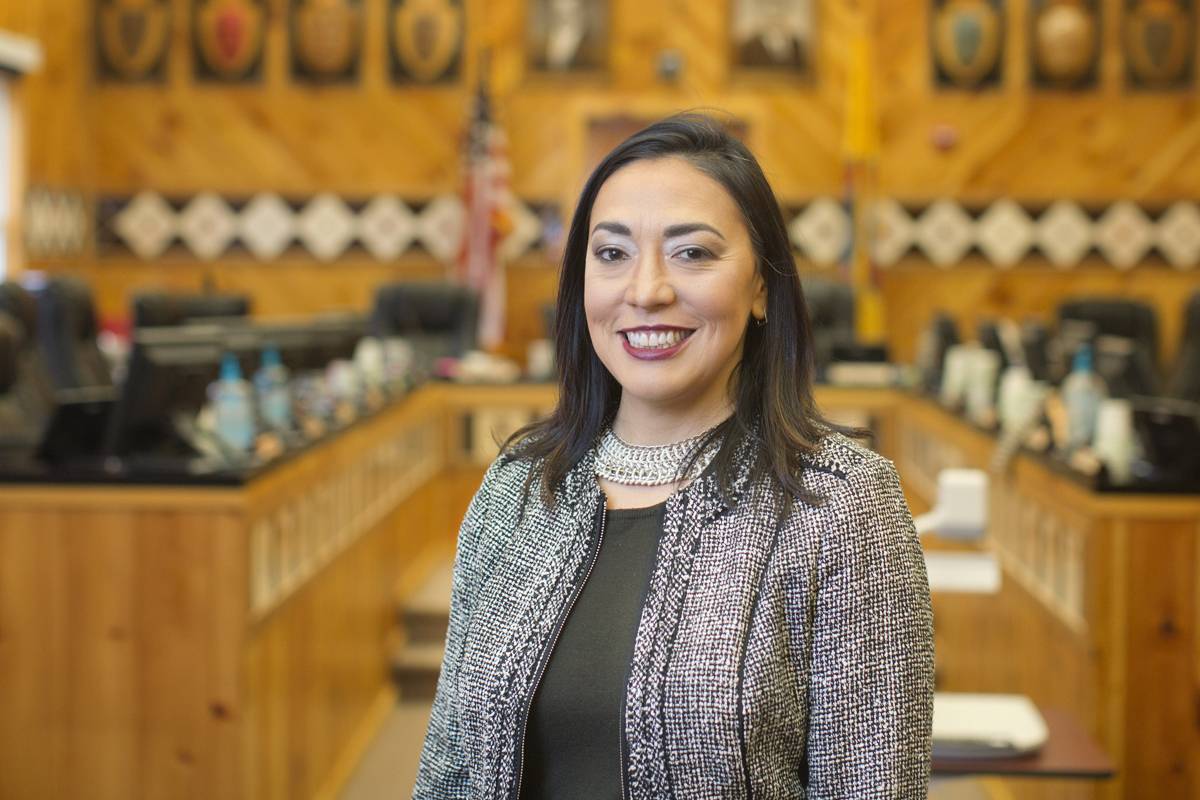Honoring Her Past
Debbie Atuk T’04 is dedicated to Native students.

Navigating the present while honoring the past is a challenge for many Native people. Debbie Atuk T’04 has found a way to do both.
For generations, the Iñupiat villagers of Wales, Alaska, danced atop the world. They danced to celebrate; they danced to communicate. Only at the insistence of Christian missionaries in the 1940s did their public dancing cease. Fifty years later, Debbie Atuk T’04 and her family reclaimed this part of their heritage by forming a dance troupe.
“We had to start by practicing to old VHS tapes. Because of the way they were filmed, we had to mimic the dancers in reverse. We were terrible for years, but now, after two decades of weekly practice, we’re very good,” she says with a laugh. “It’s one of my favorite stories about how we have been able to maintain some of our traditional culture in a very modern world.”
Navigating the present while honoring the past can be a lifelong challenge for many Native people and Atuk is no exception. It was a difficult decision for her to leave her home community in rural Alaska in pursuit of higher education. It remains a difficult decision for her to live and work in the Lower 48.
Knowing firsthand the sacrifices Native daughters and sons must often make, Atuk has dedicated the past decade to growing Dartmouth’s pan-indigenous network. In addition to serving three terms as president of the Native American Alumni Association of Dartmouth (NAAAD), she is also one of the college’s most outspoken and accessible advocates for minority students. Last year, she became the first person to win Dartmouth’s Young Alumni Distinguished Service Award without holding a Dartmouth undergraduate degree.
“The community-building, advocacy, and outreach Debbie has accomplished on behalf of Native students and alumni at Dartmouth is nothing short of amazing,” says Sally Jaeger, Tuck assistant dean and director of the MBA Program. “Her leadership is a legacy and an inspiration for all of us.”
Atuk was only one year out of Tuck when the school’s alumni services department asked her to help revive the long-defunct NAAAD as its president. Despite the demands of her career as CEO of video-on-demand Tuck startup OmniVidia, she volunteered countless hours to the organization and quickly proved herself a hands-on, visionary leader. Atuk conducted an extensive survey of all Native students and alumni before launching an ambitious slate of local and national programming, networking events, and mentorship opportunities.
Her work with Native students and communities proved so impactful and personally meaningful that Atuk decided to switch career paths. After completing a yearlong position as business director for the Colville Tribal Federal Corporation in Coulee Dam, Wash., Atuk accepted her current role as treasurer for the Eastern Band of Cherokee Indians, based in North Carolina.
“I never lose sight of my responsibility to every one of these individuals,” she says. “A big part of the position is economic development work—they have capital to invest and projects to execute on. Tuck really prepared me for this, sharpening my ability to analyze, evaluate, and make recommendations and investments.”
Atuk eventually hopes to bring her career full circle by earning election to the Bering Straits Native Corporation (BSNC) board headquartered in Nome, Alaska. (Childhood visits to her father’s office there first inspired her to consider a future in business.) Like the other corporations established to transfer wealth, money, and land back to Alaska’s indigenous people so that the United States government could claim ownership of the state, the BSNC is a for-profit organization that can pay shareholders dividends as well as contribute to community programs and scholarships.
Atuk, a recipient of one such scholarship, has built her life and career with this thought in mind. “With every job or opportunity I’ve had over the years, I always think, ‘This will be good experience for when I go back to Alaska,’” she says. “I’ve pursued my path with every intention of coming back to serve my community, and this would be a great way to bring to bear everything I’ve learned along the way. I can’t think of a more perfect application of my Tuck degree.”
The measure of how far she’s come—and how much further she’d like to go in service—really hit home the last time Atuk was in Alaska, attending the annual dance festival in Wales. Once again dancing with her family and friends, Atuk was reminded anew of the power of community, whether it’s one you are born into or one you create along the way.
“My ultimate goal, really, is to let every Native student know how much we alumni care about their wellbeing,” she says. “We may all come from different tribes, but we are one community. I want to do everything I can to help Native students and alumni be more competitive, at Dartmouth and after.”